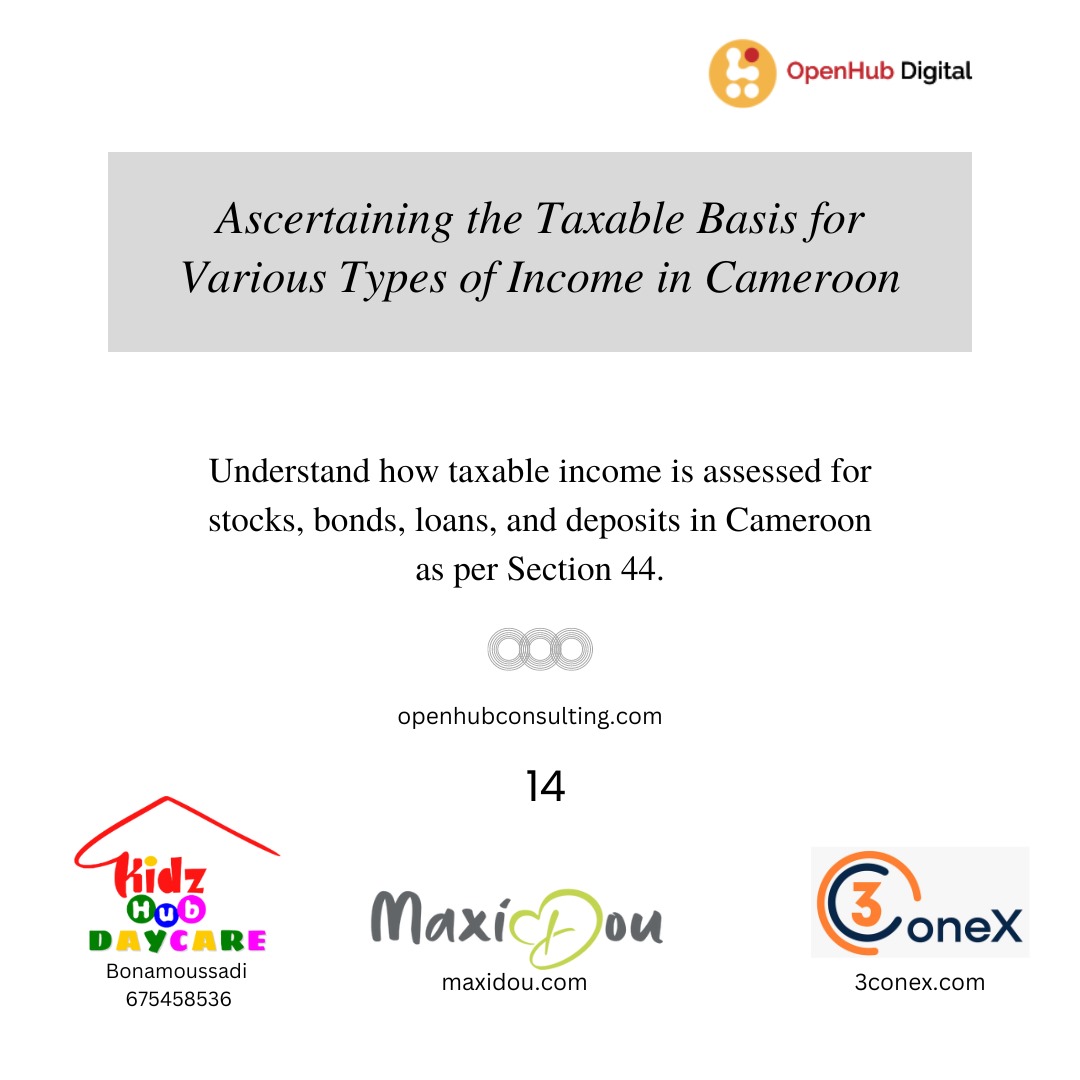Learn how taxable income is assessed for various types of income, including stocks, bonds, loans, and deposits, under Section 44 of the Cameroonian tax code. For expert business services, consult OpenHub Consulting.
In our previous post, we discussed exemptions from personal income tax in Cameroon. Today, we explore how taxable income is assessed for different financial assets, as detailed in Section 44 of the Cameroonian tax code.
How Is Taxable Income Assessed?
Section 44 outlines the methods for assessing taxable income from various financial assets, ensuring that the appropriate amount of tax is calculated and paid. Here’s a breakdown of the assessment methods:
If this article helped you, you can support our work at OpenHub.
Support OpenHub Digital1. Proceeds of Stocks and Capital Shares
Taxable income from stocks and capital shares is assessed by the gross amount of dividends allotted during the financial year.
Example
If you receive CFAF 500,000 in dividends from your shares, this amount is considered your taxable income for that year.
2. Bonds and Government Securities
Interest or income shared out from bonds and government securities is assessed for tax based on the actual interest or income earned.
Example
Earnings of CFAF 300,000 from a government bond would be assessed as taxable income.
3. Repayment Premiums
The difference between the amount reimbursed and the loan issue rate is assessed for repayment premiums.
Example
If you receive CFAF 1,000,000 on a loan that was initially CFAF 900,000, the taxable repayment premium is CFAF 100,000.
4. Income from Loans, Deposits, and Sureties
Taxable income from loans, deposits, and sureties includes the gross interest and any arrears earned during the financial year.
Example
Interest of CFAF 200,000 earned on a deposit would be considered taxable income.
5. Transfer of Shares, Bonds, and Stocks
Net overall capital gains from the transfer of shares, bonds, and stocks are assessed. Losses recorded during the financial year are offset by any net overall profits.
Example
If you sell stocks and realize a profit of CFAF 800,000 but incur a loss of CFAF 200,000 on other stocks, the net gain of CFAF 600,000 is assessed as taxable income.
6. Income from Indirect Transfers
For indirect transfers, taxable income is assessed by the capital gain obtained from the transfer price quota corresponding to the shares of the foreign entity in the Cameroonian company’s capital.
Example
Capital gains from transferring shares held by a foreign entity in a Cameroonian company are assessed based on the difference between the transfer price and the acquisition price.
Handling Capital Gains and Losses
Net overall losses from capital gains recorded in a financial year can be offset by any net overall profits recorded in the next four financial years. This provides a mechanism to manage and carry forward losses, balancing tax obligations over time.
Key Points to Remember
- Dividends and interest are assessed based on gross amounts received.
- Repayment premiums are assessed based on the difference from the issue rate.
- Net capital gains from transfers are assessed after offsetting losses.
- Losses can be carried forward for up to four years to offset future profits.
Disclaimer
This content is for informational purposes only and should not be taken as tax advice. For personalized assistance, consult a tax professional.
If this article helped you, you can support our work at OpenHub.
Support OpenHub DigitalNext Steps
In our next post, we will discuss the implications of undisclosed income and how companies and corporate bodies are taxed on such income, as outlined in Section 45. Stay tuned for more insights.
For expert business and tax services, visit OpenHub Consulting. We specialize in company registration, tax declarations, sales and marketing, bookkeeping, and accounting for small businesses in Cameroon.
Have questions? Leave a comment or revisit our previous post here.
Previous Post: Understanding the Exemptions from Personal Income Tax in Cameroon
Next Post: Tax Implications of Undisclosed Income in Cameroon
From Insight to Implementation
Going through the administrative and legal landscape in Cameroon requires more than just information—it requires a grounded local partner. At OpenHub Consulting, we specialize in helping the diaspora and international investors turn their business visions into compliant, operational realities.
If you are ready to move forward, our team is prepared to manage your registration and compliance from start to finish.
Start Your Company Incorporation →Discover more from OpenHub Digital
Subscribe to get the latest posts sent to your email.

